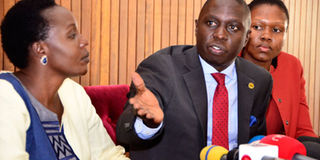MPs demand live coverage of age limit debate and voting

L-R: Kumi Woman MP Monica Amoding, Kampala Central MP Muhammad Nsereko and National Female Youth MP Adeke Ebaju address the media at Parliament on December 11, 2017. PHOTO BY ALEX ESAGALA
What you need to know:
- Should those opposed to the amendment convince the undecided to vote against the bill, then the NRM will lose the battle.
- Political analyst Frederick Kisekka–Ntale recently told the Monitor that money is likely to influence the voting pattern.
- During the press conference, the MPs mentioned another variable – intimidation.
Kampala
Debate on the lifting of the age limit for presidential candidates and the voting should be broadcast live, MPs have said.
That way, the voters will know whether their representatives in the House have voted as they were told by the electorate.
“We want to ask the Speaker [Rebecca Kadaga] to let it be broadcast live because she sent us for consultations,” Ms Monicah Amoding, Kumi Woman Representative said during a press conference at Parliament on Monday, December 11.
“Each of us has come with a position, depending on what the constituents said. Every MP is going to account to the people that he or she represents,” she said.
She urged voters across the country to closely follow the debate and voting process on the Constitution Amendment Bill 2017, which seeks to lift the age limit for presidential candidates.
Following Ms Kadaga’s suspension of 25 MPs on September 27, from three sittings of the House, the Uganda Communications Commission (UCC) warned broadcasters against live coverage.
UCC claimed live broadcasts might incite the public to turn violent.
However, UCC’s critics pointed out that UCC, whose chief executive is a government appointee, was just out to prevent the transmission of the excesses by security operatives who bundled MPs out of the House.
Monday’s press conference was attended by Theodore Ssekikubo (Lwemiyaga MP, NRM), Sam Lyomoki (Workers, NRM), John Baptist Nambeshe (Manjiya County, NRM), Felix Okot Ogong (Dokolo South, NRM), Roland Mugume (Rukungiri Municipality, FDC), Wilfred Niwagaba (Ndorwa East, Independent), William Nzoghu (Busongora North, FDC), Anna Adeke Ebaju (Youth Representative Eastern, Independent), Francis Mwijukye (Buhweju County, FDC)and Muhammad Nsereko (Kampala Central, Independent).
Mr Nsereko said they are optimistic those who do not support the lifting of the age limit will carry the day.
“We have the numbers. So far, we have up to 120 [against the lifting of the age limit. But we shall continue persuading those who are fence–sitting ,” Mr Nsereko said.
He said those against the amendment need a bigger margin.
A poll conducted by the Daily Monitor to gauge MPs position on the lifting of the age limit found that the government is short of the 66 per cent threshold of the MPs with voting rights for the bill to sail through.
Each camp will, therefore, try to win over the undecided.
According to the poll, of the 336 MPs who responded to the question, 18 per cent said they were undecided.
Twenty–nine per cent said they would vote against the amendment and 53 per cent said they would vote in support.
Should the NRM, which supports Igara West MP Raphael Magyezi’s Private Member’s Bill to amend the Constitution, win over the undecided, the bill will sail through.
Should those opposed to the amendment convince the undecided to vote against the bill, then the NRM will lose the battle.
Political analyst Frederick Kisekka–Ntale recently told the Monitor that money is likely to influence the voting pattern.
During the press conference, the MPs mentioned another variable – intimidation.
“We call upon the worried members of the NRM to join us. Many have come to us and told us ‘we are being threatened’ and others are being promised…” Mr Nsereko said.
“We would like to tell them ‘take the promises as they are, come and do the right thing by saying no. No intimidation should force you into betraying this nation for just salt.”
He noted that those for, against and the undecided are in formidable numbers and thus should not be underestimated.
They faulted the committee for restricting its consultations to the a few stakeholders within the precincts of Parliament.




